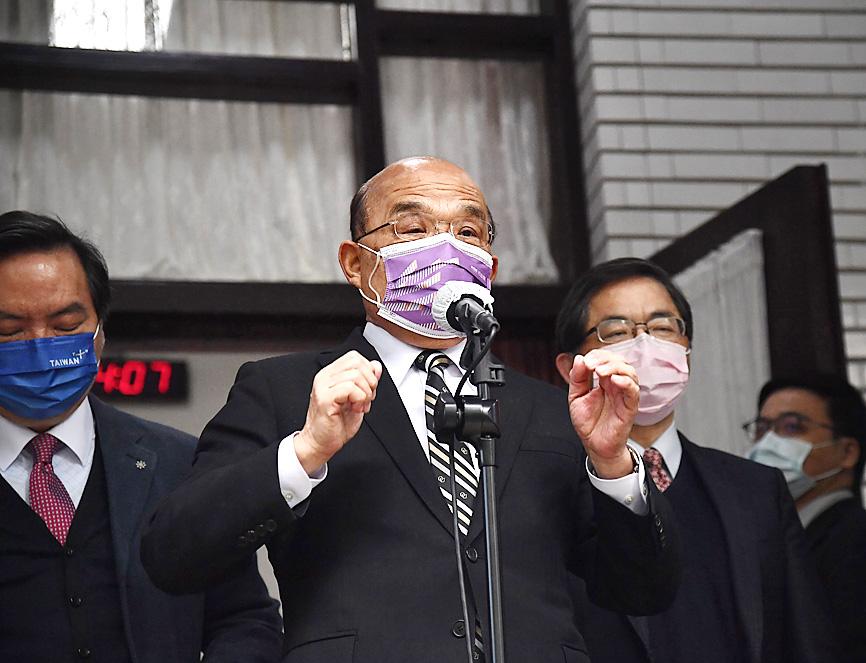Russia’s decision to put Taiwan on a list of foreign countries deemed “unfriendly” to Moscow since its invasion of Ukraine would for now have little effect on bilateral relations, Minister of Foreign Affairs Joseph Wu (吳釗燮) said yesterday.
Taiwan’s representative office in Moscow is operating normally and is carrying out its mission, including assisting Taiwanese evacuated from Ukraine, without Russian interference, Wu said.
However, the Ministry of Foreign Affairs would closely monitor the situation so that it is prepared to respond accordingly if Russia takes any action against Taiwan, he added.

Photo: CNA
Wu’s comments were made after the Russian government on Monday released a list of 48 countries and territories deemed unfriendly to Moscow because they had imposed or joined international sanctions against Russia over its invasion of Ukraine.
Taiwan is on the list along with Albania, Andorra, Australia Canada, Iceland, Japan, Liechtenstein, Monaco, Montenegro, New Zealand, North Macedonia, Norway, San Marino, Singapore, South Korea, Switzerland, Ukraine, the UK and the US, as well as EU member states and Micronesia, Russian state news agency TASS reported.
TASS mentioned Taiwan as being “considered a territory of China, but ruled by its own administration since 1949,” as Moscow has diplomatic ties with Beijing.
Russia is allowing all of its public entities, its citizens and local enterprises to pay back debts to any creditors in the listed countries and territories in rubles, which has plunged to all-time lows since the sanctions were imposed, TASS reported.
Wu told a session of the Legislative Yuan yesterday that investment and trade between Taiwan and Russia are “not very significant,” so being included on the list is not expected to have a major impact on Taiwan.
Government data for last year showed that bilateral trade between Taiwan and Russia reached US$6.31 billion, with exports to Russia totaling US$1.32 billion and accounting for 0.76 percent of total outbound sales.
According to the Ministry of Economic Affairs, Taiwan mainly exports to Russia machine parts, discs, auto parts, audio and visual signal equipment, polycarbonate resin and stainless steel flat-rolled products, while mainly importing raw materials, early-stage processed products — such as coal, petroleum, aluminum and iron — and non-alloy steel semi-finished products.
In 2019, Russia became Taiwan’s ninth-largest machine tool export market, with exported machine tools totaling US$107.95 million.
Meanwhile, total trade volume with Ukraine in the first 11 months of last year totaled US$280.75 million and accounted for 0.037 percent of Taiwan’s total trade volume.
Democratic Progressive Party (DPP) Legislator Lo Chih-cheng (羅致政), who doubles as the DPP’s head of international affairs, told reporters that Taiwan did not need to worry too much about being on Russia’s list of unfriendly countries.
Taiwan is joining many countries worldwide in showing solidarity with Ukraine and has the “moral high ground,” Lo said.
Taiwan has announced that it intends to join the US and other countries in imposing sanctions against Russia over its invasion of Ukraine, but it has yet to provide further details.
The nation also launched a fundraising campaign that has so far raised more than NT$400 million (US$14.11 million) in less than a week and donated supplies to Ukraine.

MAKING WAVES: China’s maritime militia could become a nontraditional threat in war, clogging up shipping lanes to prevent US or Japanese intervention, a report said About 1,900 Chinese ships flying flags of convenience and fishing vessels that participated in China’s military exercises around Taiwan last month and in January have been listed for monitoring, Coast Guard Administration (CGA) Deputy Director-General Hsieh Ching-chin (謝慶欽) said yesterday. Following amendments to the Commercial Port Act (商港法) and the Law of Ships (船舶法) last month, the CGA can designate possible berthing areas or deny ports of call for vessels suspected of loitering around areas where undersea cables can be accessed, Oceans Affairs Council Minister Kuan Bi-ling (管碧玲) said. The list of suspected ships, originally 300, had risen to about 1,900 as

Japan’s strategic alliance with the US would collapse if Tokyo were to turn away from a conflict in Taiwan, Japanese Prime Minister Sanae Takaichi said yesterday, but distanced herself from previous comments that suggested a possible military response in such an event. Takaichi expressed her latest views on a nationally broadcast TV program late on Monday, where an opposition party leader criticized her for igniting tensions with China with the earlier remarks. Ties between Japan and China have sunk to the worst level in years after Takaichi said in November that a hypothetical Chinese attack on Taiwan could bring about a Japanese

Right-wing political scientist Laura Fernandez on Sunday won Costa Rica’s presidential election by a landslide, after promising to crack down on rising violence linked to the cocaine trade. Fernandez’s nearest rival, economist Alvaro Ramos, conceded defeat as results showed the ruling party far exceeding the threshold of 40 percent needed to avoid a runoff. With 94 percent of polling stations counted, the political heir of outgoing Costa Rican President Rodrigo Chaves had captured 48.3 percent of the vote compared with Ramos’ 33.4 percent, the Supreme Electoral Tribunal said. As soon as the first results were announced, members of Fernandez’s Sovereign People’s Party

MORE RESPONSIBILITY: Draftees would be expected to fight alongside professional soldiers, likely requiring the transformation of some training brigades into combat units The armed forces are to start incorporating new conscripts into combined arms brigades this year to enhance combat readiness, the Executive Yuan’s latest policy report said. The new policy would affect Taiwanese men entering the military for their compulsory service, which was extended to one year under reforms by then-president Tsai Ing-wen (蔡英文) in 2022. The conscripts would be trained to operate machine guns, uncrewed aerial vehicles, anti-tank guided missile launchers and Stinger air defense systems, the report said, adding that the basic training would be lengthened to eight weeks. After basic training, conscripts would be sorted into infantry battalions that would take